Risk analysis and management in construction -
VerifiedAdded on 2022/09/02
|6
|1443
|15
AI Summary
Contribute Materials
Your contribution can guide someone’s learning journey. Share your
documents today.
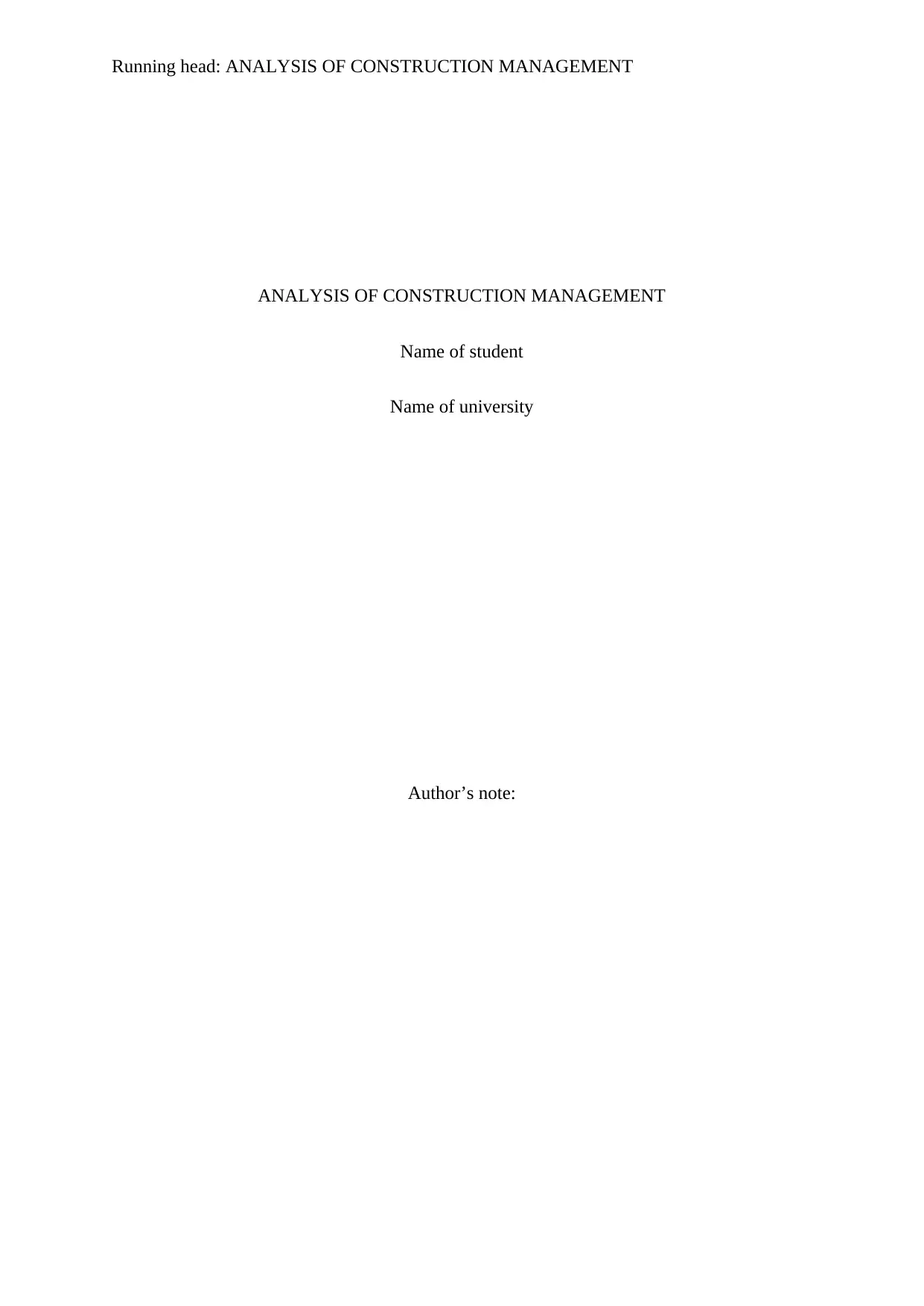
Running head: ANALYSIS OF CONSTRUCTION MANAGEMENT
ANALYSIS OF CONSTRUCTION MANAGEMENT
Name of student
Name of university
Author’s note:
ANALYSIS OF CONSTRUCTION MANAGEMENT
Name of student
Name of university
Author’s note:
Secure Best Marks with AI Grader
Need help grading? Try our AI Grader for instant feedback on your assignments.
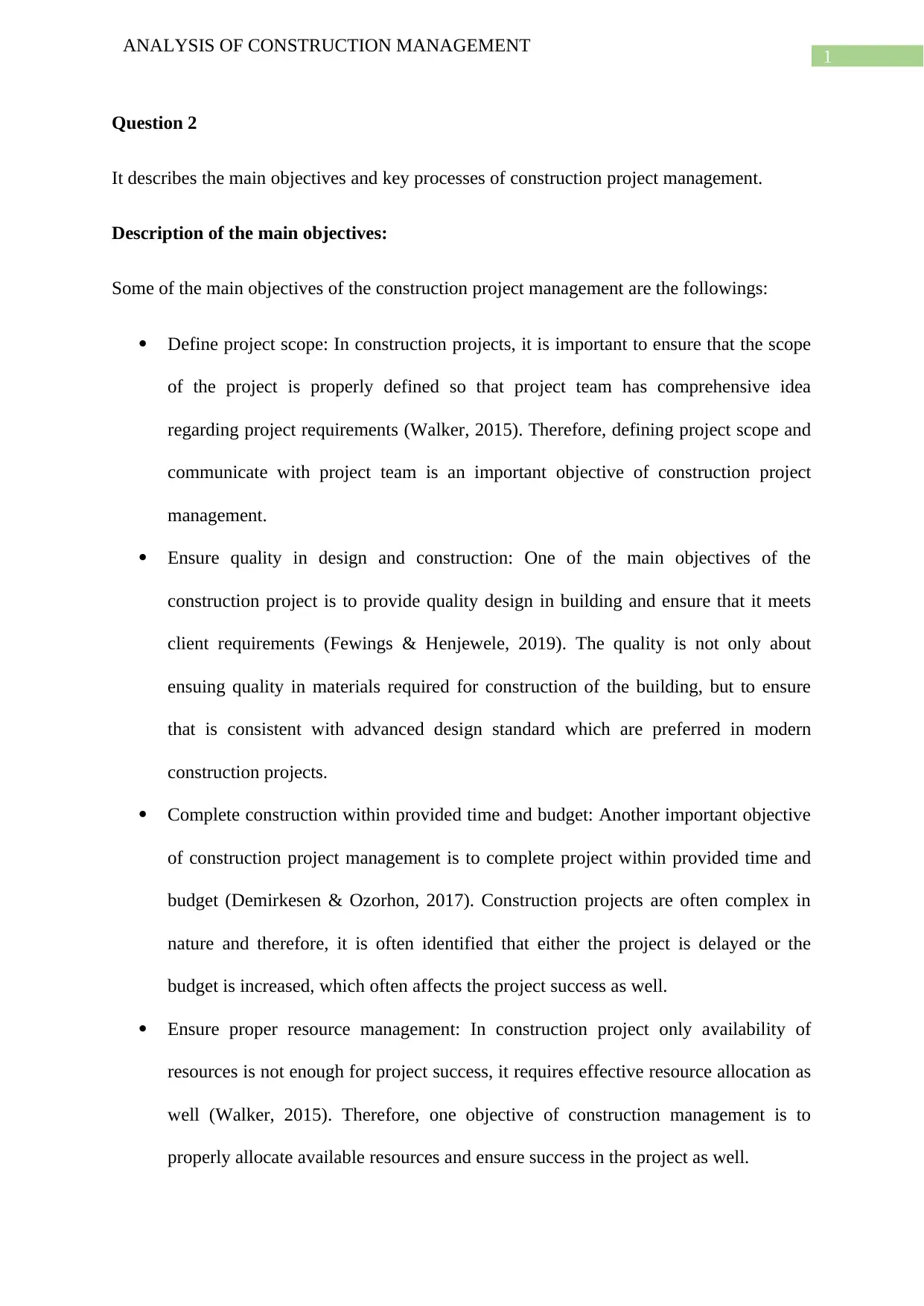
1
ANALYSIS OF CONSTRUCTION MANAGEMENT
Question 2
It describes the main objectives and key processes of construction project management.
Description of the main objectives:
Some of the main objectives of the construction project management are the followings:
Define project scope: In construction projects, it is important to ensure that the scope
of the project is properly defined so that project team has comprehensive idea
regarding project requirements (Walker, 2015). Therefore, defining project scope and
communicate with project team is an important objective of construction project
management.
Ensure quality in design and construction: One of the main objectives of the
construction project is to provide quality design in building and ensure that it meets
client requirements (Fewings & Henjewele, 2019). The quality is not only about
ensuing quality in materials required for construction of the building, but to ensure
that is consistent with advanced design standard which are preferred in modern
construction projects.
Complete construction within provided time and budget: Another important objective
of construction project management is to complete project within provided time and
budget (Demirkesen & Ozorhon, 2017). Construction projects are often complex in
nature and therefore, it is often identified that either the project is delayed or the
budget is increased, which often affects the project success as well.
Ensure proper resource management: In construction project only availability of
resources is not enough for project success, it requires effective resource allocation as
well (Walker, 2015). Therefore, one objective of construction management is to
properly allocate available resources and ensure success in the project as well.
ANALYSIS OF CONSTRUCTION MANAGEMENT
Question 2
It describes the main objectives and key processes of construction project management.
Description of the main objectives:
Some of the main objectives of the construction project management are the followings:
Define project scope: In construction projects, it is important to ensure that the scope
of the project is properly defined so that project team has comprehensive idea
regarding project requirements (Walker, 2015). Therefore, defining project scope and
communicate with project team is an important objective of construction project
management.
Ensure quality in design and construction: One of the main objectives of the
construction project is to provide quality design in building and ensure that it meets
client requirements (Fewings & Henjewele, 2019). The quality is not only about
ensuing quality in materials required for construction of the building, but to ensure
that is consistent with advanced design standard which are preferred in modern
construction projects.
Complete construction within provided time and budget: Another important objective
of construction project management is to complete project within provided time and
budget (Demirkesen & Ozorhon, 2017). Construction projects are often complex in
nature and therefore, it is often identified that either the project is delayed or the
budget is increased, which often affects the project success as well.
Ensure proper resource management: In construction project only availability of
resources is not enough for project success, it requires effective resource allocation as
well (Walker, 2015). Therefore, one objective of construction management is to
properly allocate available resources and ensure success in the project as well.
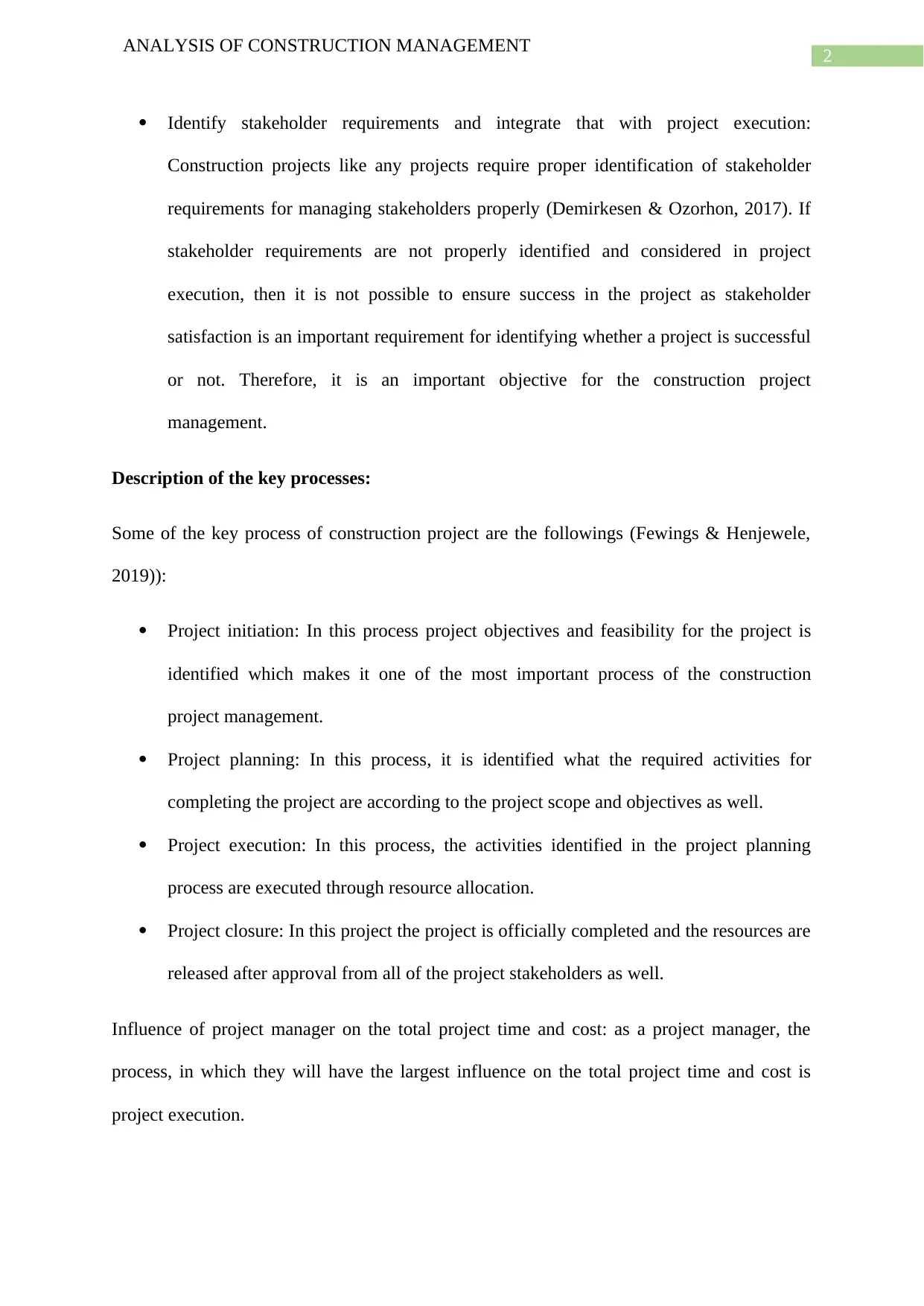
2
ANALYSIS OF CONSTRUCTION MANAGEMENT
Identify stakeholder requirements and integrate that with project execution:
Construction projects like any projects require proper identification of stakeholder
requirements for managing stakeholders properly (Demirkesen & Ozorhon, 2017). If
stakeholder requirements are not properly identified and considered in project
execution, then it is not possible to ensure success in the project as stakeholder
satisfaction is an important requirement for identifying whether a project is successful
or not. Therefore, it is an important objective for the construction project
management.
Description of the key processes:
Some of the key process of construction project are the followings (Fewings & Henjewele,
2019)):
Project initiation: In this process project objectives and feasibility for the project is
identified which makes it one of the most important process of the construction
project management.
Project planning: In this process, it is identified what the required activities for
completing the project are according to the project scope and objectives as well.
Project execution: In this process, the activities identified in the project planning
process are executed through resource allocation.
Project closure: In this project the project is officially completed and the resources are
released after approval from all of the project stakeholders as well.
Influence of project manager on the total project time and cost: as a project manager, the
process, in which they will have the largest influence on the total project time and cost is
project execution.
ANALYSIS OF CONSTRUCTION MANAGEMENT
Identify stakeholder requirements and integrate that with project execution:
Construction projects like any projects require proper identification of stakeholder
requirements for managing stakeholders properly (Demirkesen & Ozorhon, 2017). If
stakeholder requirements are not properly identified and considered in project
execution, then it is not possible to ensure success in the project as stakeholder
satisfaction is an important requirement for identifying whether a project is successful
or not. Therefore, it is an important objective for the construction project
management.
Description of the key processes:
Some of the key process of construction project are the followings (Fewings & Henjewele,
2019)):
Project initiation: In this process project objectives and feasibility for the project is
identified which makes it one of the most important process of the construction
project management.
Project planning: In this process, it is identified what the required activities for
completing the project are according to the project scope and objectives as well.
Project execution: In this process, the activities identified in the project planning
process are executed through resource allocation.
Project closure: In this project the project is officially completed and the resources are
released after approval from all of the project stakeholders as well.
Influence of project manager on the total project time and cost: as a project manager, the
process, in which they will have the largest influence on the total project time and cost is
project execution.
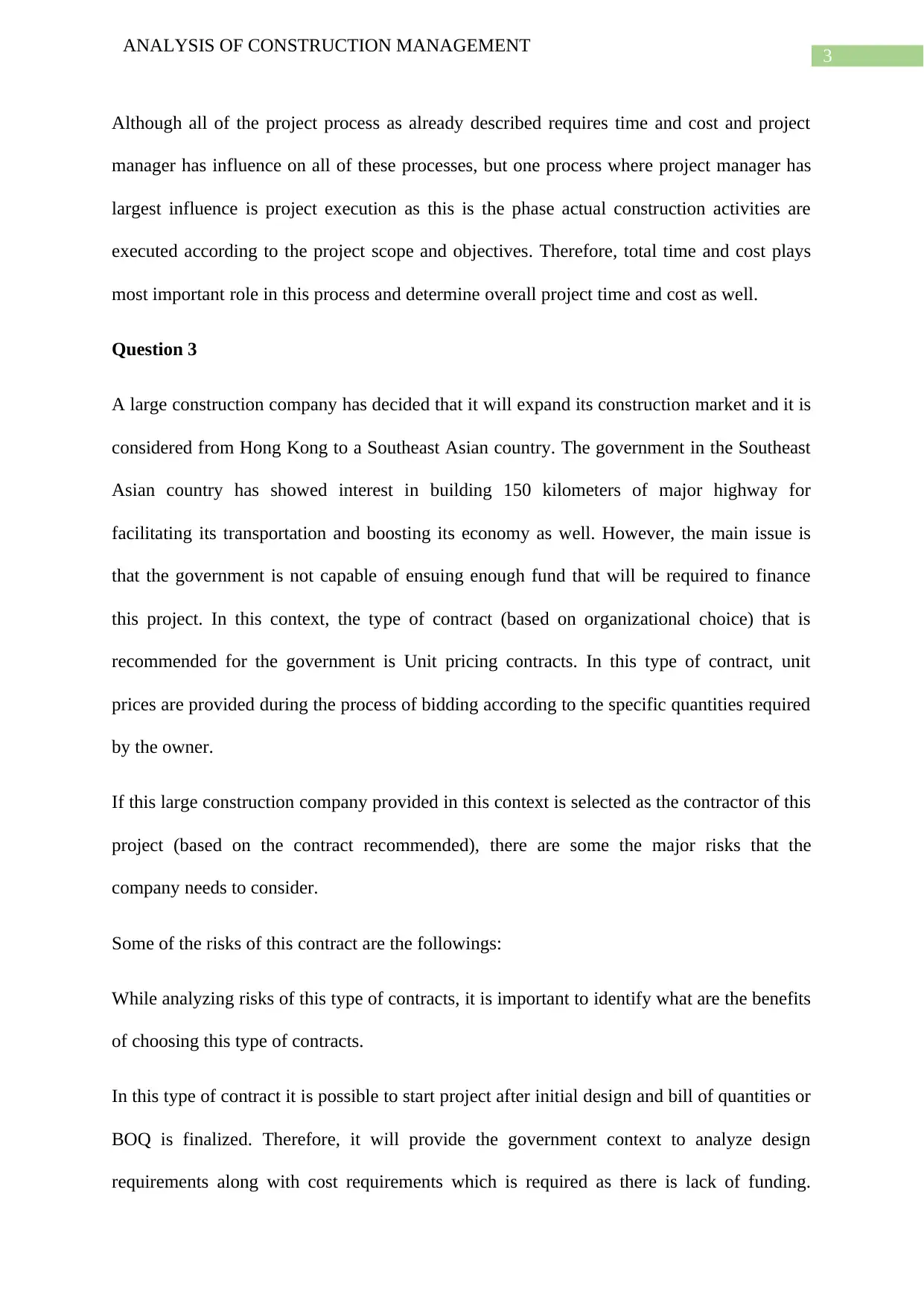
3
ANALYSIS OF CONSTRUCTION MANAGEMENT
Although all of the project process as already described requires time and cost and project
manager has influence on all of these processes, but one process where project manager has
largest influence is project execution as this is the phase actual construction activities are
executed according to the project scope and objectives. Therefore, total time and cost plays
most important role in this process and determine overall project time and cost as well.
Question 3
A large construction company has decided that it will expand its construction market and it is
considered from Hong Kong to a Southeast Asian country. The government in the Southeast
Asian country has showed interest in building 150 kilometers of major highway for
facilitating its transportation and boosting its economy as well. However, the main issue is
that the government is not capable of ensuing enough fund that will be required to finance
this project. In this context, the type of contract (based on organizational choice) that is
recommended for the government is Unit pricing contracts. In this type of contract, unit
prices are provided during the process of bidding according to the specific quantities required
by the owner.
If this large construction company provided in this context is selected as the contractor of this
project (based on the contract recommended), there are some the major risks that the
company needs to consider.
Some of the risks of this contract are the followings:
While analyzing risks of this type of contracts, it is important to identify what are the benefits
of choosing this type of contracts.
In this type of contract it is possible to start project after initial design and bill of quantities or
BOQ is finalized. Therefore, it will provide the government context to analyze design
requirements along with cost requirements which is required as there is lack of funding.
ANALYSIS OF CONSTRUCTION MANAGEMENT
Although all of the project process as already described requires time and cost and project
manager has influence on all of these processes, but one process where project manager has
largest influence is project execution as this is the phase actual construction activities are
executed according to the project scope and objectives. Therefore, total time and cost plays
most important role in this process and determine overall project time and cost as well.
Question 3
A large construction company has decided that it will expand its construction market and it is
considered from Hong Kong to a Southeast Asian country. The government in the Southeast
Asian country has showed interest in building 150 kilometers of major highway for
facilitating its transportation and boosting its economy as well. However, the main issue is
that the government is not capable of ensuing enough fund that will be required to finance
this project. In this context, the type of contract (based on organizational choice) that is
recommended for the government is Unit pricing contracts. In this type of contract, unit
prices are provided during the process of bidding according to the specific quantities required
by the owner.
If this large construction company provided in this context is selected as the contractor of this
project (based on the contract recommended), there are some the major risks that the
company needs to consider.
Some of the risks of this contract are the followings:
While analyzing risks of this type of contracts, it is important to identify what are the benefits
of choosing this type of contracts.
In this type of contract it is possible to start project after initial design and bill of quantities or
BOQ is finalized. Therefore, it will provide the government context to analyze design
requirements along with cost requirements which is required as there is lack of funding.
Secure Best Marks with AI Grader
Need help grading? Try our AI Grader for instant feedback on your assignments.
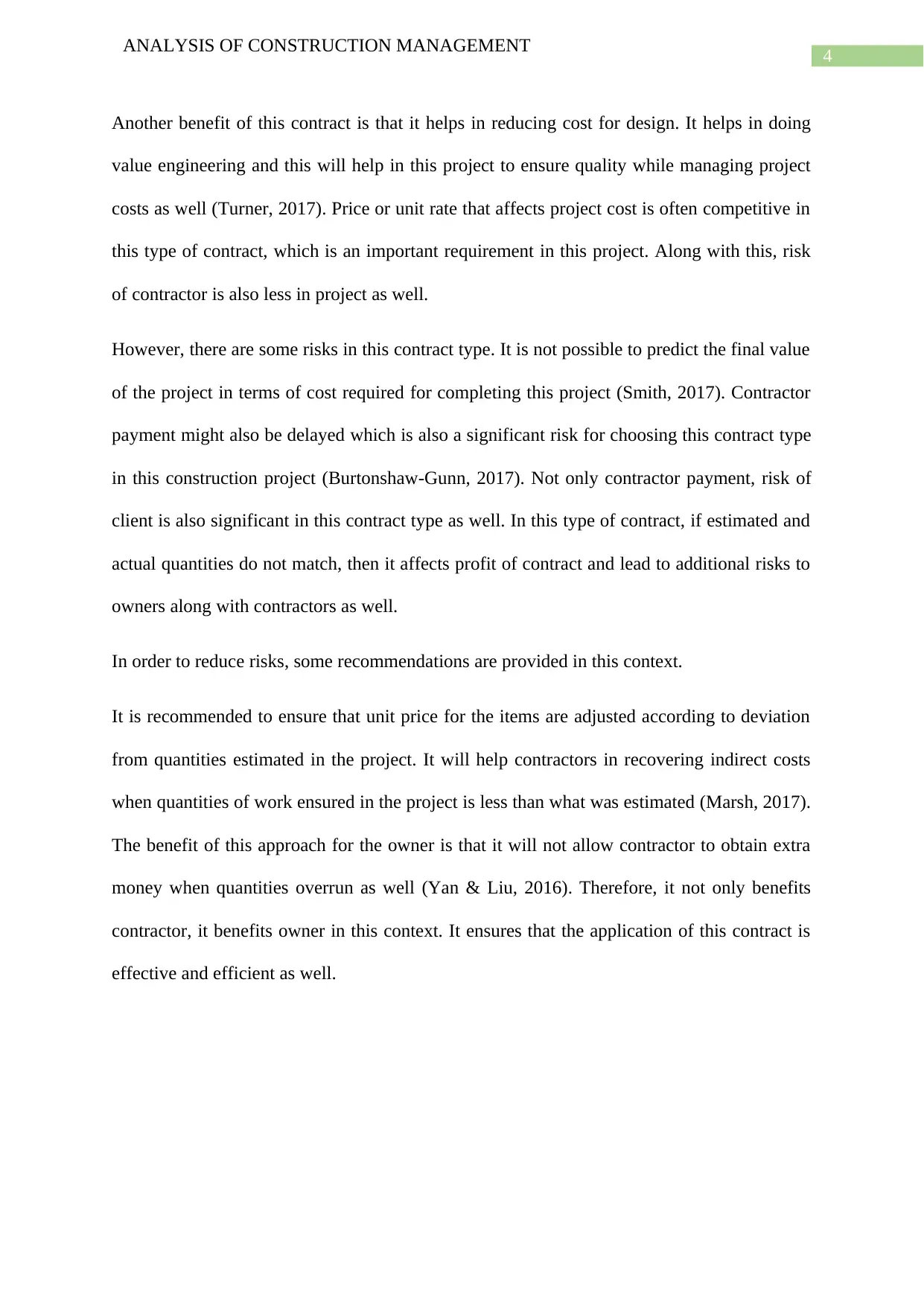
4
ANALYSIS OF CONSTRUCTION MANAGEMENT
Another benefit of this contract is that it helps in reducing cost for design. It helps in doing
value engineering and this will help in this project to ensure quality while managing project
costs as well (Turner, 2017). Price or unit rate that affects project cost is often competitive in
this type of contract, which is an important requirement in this project. Along with this, risk
of contractor is also less in project as well.
However, there are some risks in this contract type. It is not possible to predict the final value
of the project in terms of cost required for completing this project (Smith, 2017). Contractor
payment might also be delayed which is also a significant risk for choosing this contract type
in this construction project (Burtonshaw-Gunn, 2017). Not only contractor payment, risk of
client is also significant in this contract type as well. In this type of contract, if estimated and
actual quantities do not match, then it affects profit of contract and lead to additional risks to
owners along with contractors as well.
In order to reduce risks, some recommendations are provided in this context.
It is recommended to ensure that unit price for the items are adjusted according to deviation
from quantities estimated in the project. It will help contractors in recovering indirect costs
when quantities of work ensured in the project is less than what was estimated (Marsh, 2017).
The benefit of this approach for the owner is that it will not allow contractor to obtain extra
money when quantities overrun as well (Yan & Liu, 2016). Therefore, it not only benefits
contractor, it benefits owner in this context. It ensures that the application of this contract is
effective and efficient as well.
ANALYSIS OF CONSTRUCTION MANAGEMENT
Another benefit of this contract is that it helps in reducing cost for design. It helps in doing
value engineering and this will help in this project to ensure quality while managing project
costs as well (Turner, 2017). Price or unit rate that affects project cost is often competitive in
this type of contract, which is an important requirement in this project. Along with this, risk
of contractor is also less in project as well.
However, there are some risks in this contract type. It is not possible to predict the final value
of the project in terms of cost required for completing this project (Smith, 2017). Contractor
payment might also be delayed which is also a significant risk for choosing this contract type
in this construction project (Burtonshaw-Gunn, 2017). Not only contractor payment, risk of
client is also significant in this contract type as well. In this type of contract, if estimated and
actual quantities do not match, then it affects profit of contract and lead to additional risks to
owners along with contractors as well.
In order to reduce risks, some recommendations are provided in this context.
It is recommended to ensure that unit price for the items are adjusted according to deviation
from quantities estimated in the project. It will help contractors in recovering indirect costs
when quantities of work ensured in the project is less than what was estimated (Marsh, 2017).
The benefit of this approach for the owner is that it will not allow contractor to obtain extra
money when quantities overrun as well (Yan & Liu, 2016). Therefore, it not only benefits
contractor, it benefits owner in this context. It ensures that the application of this contract is
effective and efficient as well.
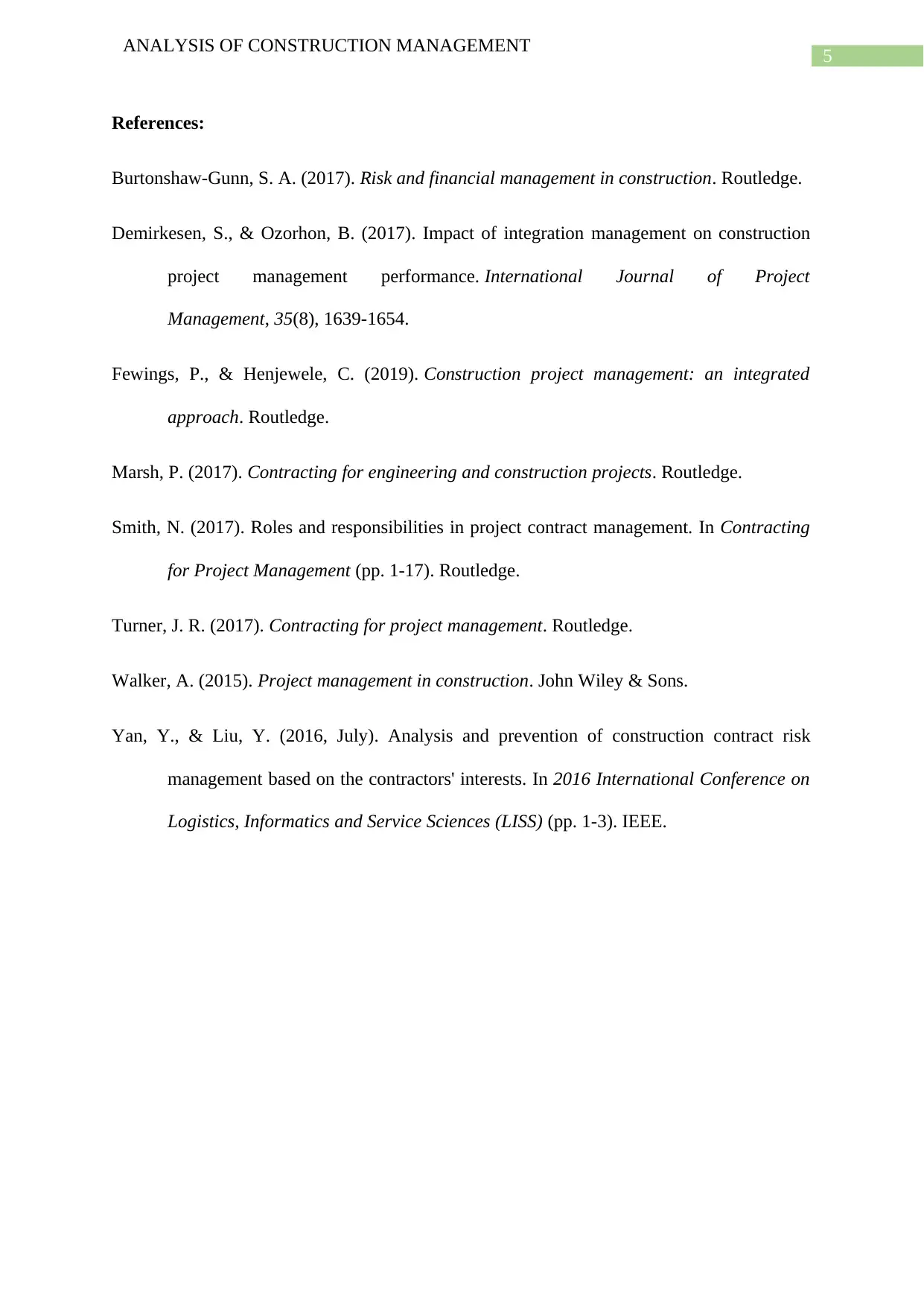
5
ANALYSIS OF CONSTRUCTION MANAGEMENT
References:
Burtonshaw-Gunn, S. A. (2017). Risk and financial management in construction. Routledge.
Demirkesen, S., & Ozorhon, B. (2017). Impact of integration management on construction
project management performance. International Journal of Project
Management, 35(8), 1639-1654.
Fewings, P., & Henjewele, C. (2019). Construction project management: an integrated
approach. Routledge.
Marsh, P. (2017). Contracting for engineering and construction projects. Routledge.
Smith, N. (2017). Roles and responsibilities in project contract management. In Contracting
for Project Management (pp. 1-17). Routledge.
Turner, J. R. (2017). Contracting for project management. Routledge.
Walker, A. (2015). Project management in construction. John Wiley & Sons.
Yan, Y., & Liu, Y. (2016, July). Analysis and prevention of construction contract risk
management based on the contractors' interests. In 2016 International Conference on
Logistics, Informatics and Service Sciences (LISS) (pp. 1-3). IEEE.
ANALYSIS OF CONSTRUCTION MANAGEMENT
References:
Burtonshaw-Gunn, S. A. (2017). Risk and financial management in construction. Routledge.
Demirkesen, S., & Ozorhon, B. (2017). Impact of integration management on construction
project management performance. International Journal of Project
Management, 35(8), 1639-1654.
Fewings, P., & Henjewele, C. (2019). Construction project management: an integrated
approach. Routledge.
Marsh, P. (2017). Contracting for engineering and construction projects. Routledge.
Smith, N. (2017). Roles and responsibilities in project contract management. In Contracting
for Project Management (pp. 1-17). Routledge.
Turner, J. R. (2017). Contracting for project management. Routledge.
Walker, A. (2015). Project management in construction. John Wiley & Sons.
Yan, Y., & Liu, Y. (2016, July). Analysis and prevention of construction contract risk
management based on the contractors' interests. In 2016 International Conference on
Logistics, Informatics and Service Sciences (LISS) (pp. 1-3). IEEE.
1 out of 6
Related Documents
Your All-in-One AI-Powered Toolkit for Academic Success.
+13062052269
info@desklib.com
Available 24*7 on WhatsApp / Email
![[object Object]](/_next/static/media/star-bottom.7253800d.svg)
Unlock your academic potential
© 2024 | Zucol Services PVT LTD | All rights reserved.





